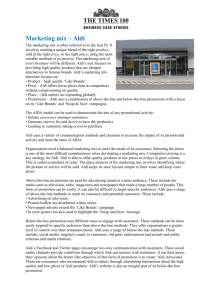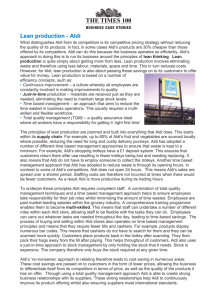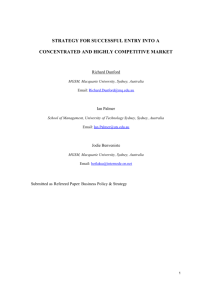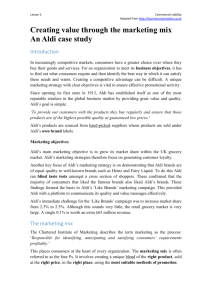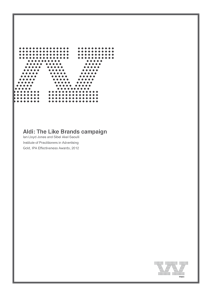Aldi - University of Huddersfield Repository
advertisement
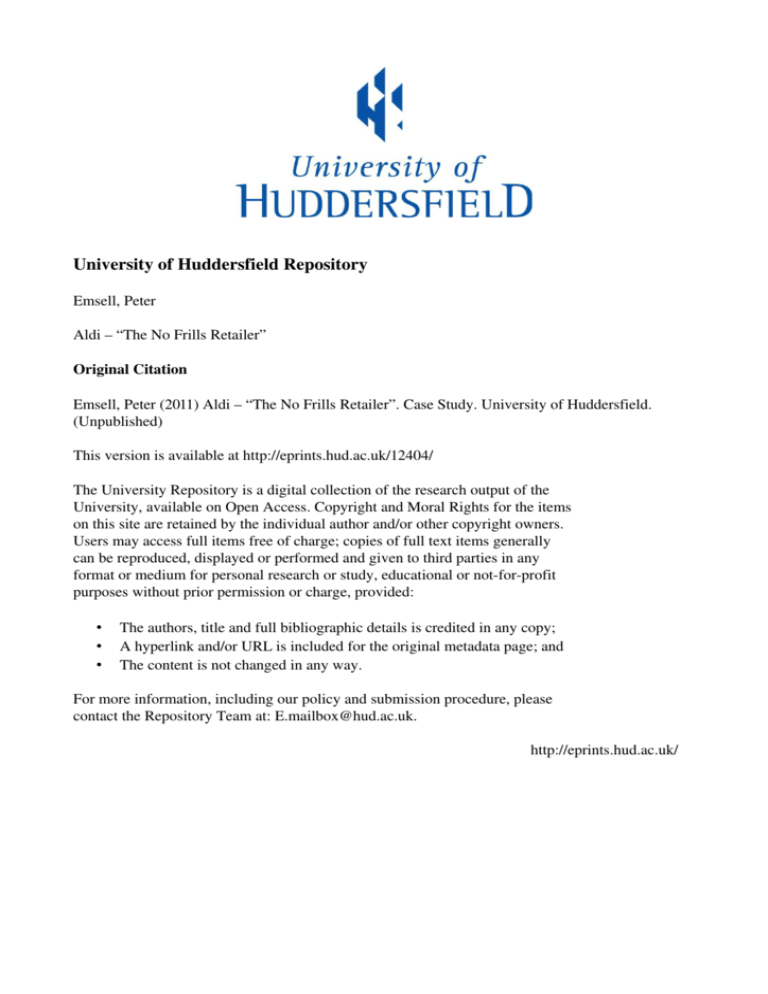
University of Huddersfield Repository Emsell, Peter Aldi – “The No Frills Retailer” Original Citation Emsell, Peter (2011) Aldi – “The No Frills Retailer”. Case Study. University of Huddersfield. (Unpublished) This version is available at http://eprints.hud.ac.uk/12404/ The University Repository is a digital collection of the research output of the University, available on Open Access. Copyright and Moral Rights for the items on this site are retained by the individual author and/or other copyright owners. Users may access full items free of charge; copies of full text items generally can be reproduced, displayed or performed and given to third parties in any format or medium for personal research or study, educational or not-for-profit purposes without prior permission or charge, provided: • • • The authors, title and full bibliographic details is credited in any copy; A hyperlink and/or URL is included for the original metadata page; and The content is not changed in any way. For more information, including our policy and submission procedure, please contact the Repository Team at: E.mailbox@hud.ac.uk. http://eprints.hud.ac.uk/ 1 Aldi – “The No Frills Retailer” by Peter Emsell and contributions from Leigh Morland Aldi - the global no frills global grocer - is challenging the business model of supermarketing in the UK in a similar way to how Ryanair has challenged the business operating model of the airline industry over the last 25 years. Past evidence shows that achieving success in business has much to do with being aware and in touch with the external factors surrounding the industry that the business operates within and playing to it’s strengths. It is also said that it’s essential to have a clear strategy aligned to a set of core values. Ryanair is a clear example of this; a low cost airline that continues to challenge competitors with a distinct and apparently sustainable business model in a complex industry sector. Ryanair’s success is based on keeping costs to a minimum and adopting a simple, effective service offering, this is energised by an open and candid culture to cutting out waste but without compromising on the essential safety and quality aspects of commercial airline business. Does the supermarket industry afford the same opportunities; can a no-frills model prosper in this context? Aldi (Albrecht Discount) is a family based, discount supermarket chain based in Germany. The first foundation stone was laid in 1913 with the opening of a small food store in the German town of Essen. It didn't take long for this little 'service store' to become a popular place to shop. During the '40s, an expansion program was created and more ALDI stores opened. By the 1960’s there were 300 stores in Germany. The chain is now international and made up of two separate groups, ALDI Nord (North) headquartered in Essen and ALDI Süd (South), headquartered in Mulheim an der Ruhr. These organisations operate independently from each other within specific market boundaries. The individual groups were originally owned and managed by brothers Karl Albrecht and Theo Albrecht; Karl has since retired and is now Germany's richest man. Theo was Germany's second richest man until his death in July 2010. The core values and principles that the brothers founded the business upon at the outset continue to be central to the strategic direction and decision making principles today. • • • 1 Consistency Simplicity Responsibility This case has been written for the purpose of in class discussion and the practice of case study analysis rather than to illustrate the effective or ineffective handling of a strategic management situation. Consistency - leads to reliability. We mean what we say. We are consistent in our dealings with people, product, price and all other aspects of our day to day professional life. Simplicity - creates efficiency, clarity and clear orientation within our organisation as well as for our customers. Responsibility - stands for our commitment towards our people, customers, partners and the environment. It also includes principles such as fairness, honesty, openness, service orientation and friendliness. Extract from Aldi management system Aldi also has a keen eye on cost control that is built into the DNA and culture of the business. With lower levels of staffing and a payroll cost that is significantly lower than its competitors. It still manages to pay individuals higher rates of pay and thereby achieve high levels of capability in-store than it’s rivals. According to one senior manager ‘we all simply have to work smarter and harder’. Allied to this, Aldi have invested in sophisticated till systems and place a lot of emphasis on staff training, for both customer facing staff and the managers who access the facilities for measurement and control purposes. In contrast to many of its UK rivals, all Aldi stores operate limited opening hours. It only recently extended trading hours 12 hours a day to 8am to 8pm, when many competitors are moving 24/7/365 opening. In fact there is a clear strategic intention not to keep shoppers at the store longer than necessary. Aldi have declined to follow the pack regarding introducing add on facilities such as - cafe’s, lottery terminals, children’s rides, photo booths, toilets, dry cleaning services, currency exchanges, newsagent tobacco and sweets counters on entry and exit, and so forth. None of these will be seen in an Aldi store. The reason being that ultimately Aldi believe these facilities have to be paid for in some shape or form and therefore will add to the end cost. For anyone who has shopped at Aldi they will have noticed other subtle aspects of cost saving. Aldi only take debit cards and cash not credit cards. Thereby eliminating the charges connected with the Visa and Mastercard companies which are typically 3-5% of sales transactions. Customers are expected to collect and return trolleys themselves from a single collection and drop point, saving on staffing costs. Merchandising and shelf presentation is fairly basic with some products still stacked on pallets and left in packing boxes. All small actions on the surface but which when multiplied contribute to significant cost saving across the business. Aldi don’t spend heavily on celebrity endorsement and adverting like other retailers do. In 2010 Phil Vickery the Chef was used in a Christmas special advertising campaign whilst others like Sainsbury’s, ASDA, M&S and Morrison’s spent much more heavily in this area using many high profile celebrity names in an effort to gain market share. Aldi operates in 70 international regions all the regions have a standard organisational structure. Globally they work according to a common set of principles of leadership and teamwork. It all starts by attracting the right calibre of people with the incentive of high levels of pay and a promise of managerial autonomy. Aldi proudly claim to be committed to growing people and giving them responsibility in the early years of their careers. For instance the Aldi Graduate Scheme starts new recruits on very high, top quartile salary and then go on within 2 years to run their own stores on a structure similar to a franchising model basis, where a ‘blue print support package’ is given to each store manager but ultimately it is they themselves who determine the success of the store through their own motivation and management skills. For those who perform to expectations it carries a salary that is again in the top quartile for the retail sector. Based on the success of this Graduate scheme Aldi have recently introduced an Apprentice scheme which is structured along similar lines and is part of the overall talent management initiative. The intention is to develop the management workforce to support the sustainability and future growth of the business. All this attention to people management is reflected in the accolade of the company being rated as overall number four in the Times top 100 best companies to work for. Not everyone, however, is supportive of Aldi’s people management practices; critics point to the fact, that similar to German discounter Lidl, there is an anti-union stance. Moreover 200 store managers in the United States filed charges against unfair labour practices. The managers claimed that they were illegally classified as exempt from overtime pay and were resigned to a fixed salary regardless of the actual number of hours worked. In 2001 Aldi paid damages to a UK shop manager fired for being HIV-positive. Aldi reached an outof-court settlement with a former manager, shortly before an employment tribunal hearing. The manager complained of discrimination after he was asked to leave because bosses said other staff felt uncomfortable around him; it is thought the damages paid ran to six figures. In June 2011 there were 440 stores in the UK and this number is forecast to expand at 20-30 new stores per year. Store size is relatively low in comparison to its competitors at an average floor space of between 650sq/m to 1000sq/m. Only recently have larger stores been trialled at 1125sq/m. Aldi requires that store size be conducive to the scope of one manager and a small team, who are expected to run the whole operation efficiently and profitably. Consequently by doing this, a very low payroll to sales turnover ratio can be achieved and analysis shows that this is typically in the region of 5-10% (payroll-sales ratio) which is remarkable in comparison with other comparable retailers. As mentioned the growth of new stores is a key part of the business strategy and therefore an area that receives close management attention. The new international optimum standard for new build stores has recently been agreed and set at 990sq/m for the very reasons outlined above. Also when building new stores the property management team are constantly looking at the level of new build costs. With a close eye for detail and a focus on stripping out unnecessary costs, looking for new innovations in ergonomics, as well as the way each site is physically constructed and fitted out. All these factors get micro attention to detail. The traditional back office support functions of HR, Marketing, IT and so forth are conspicuous by their absence in the organisational structure. There are no teams of staff employees dedicated to the production of thick staff manuals. Only a very small regional team supports the stores and the logistics operations. The purchasing department is the only main function that could be classed as centralised and this function is based for the UK in Atherstone in the Midlands. All this is aimed at giving accountability for the essentials of staff and store management to the store managers. Allowing them to respond more quickly to factors relating to customer service, stock and quality control issues. So overall it would be appropriate to say that Aldi is a quite decentralised structure, flat hierarchical reporting lines and lots of management autonomy. Clearly following such a strategy accepts that some weaknesses may occur from time to time. Particularly from a quality and consistency viewpoint but the cost benefits of adopting a heavier centralised approaches similar to other well known retailers, is be seen as a strategic compromise that the business is prepared to take. That said and in order to ensure there are no glaring gaps in systems, processes and operating practices occur, a small number of ‘pan organisational’ committees are in place. These are made up of line managerial staff who have may have key capabilities or are have specialist knowledge in their field of work. The aim of these committees is to identify any gaps in systems, processes and structure, as well as keeping up to speed on best practice and key external factors that could impinge on the Aldi business overall. Above this sits the very small but extremely powerful Group Administrative Board that still resides in Essen, Germany and governs the key aspects of this global organisation. ALDI ORGANISATIONAL CHART – STANDARD REGIONAL MODEL (70 Regions globally) Regional Managing Director Finance & Admin Director Support Team Trading Director Store Operations Director Store Managers Store Employees Property Director Logistics Director Logistics Managers Logistics Employees In terms of sales philosophy Aldi adopts a very simple approach - get the product and price right and it will sell. Branded products carry much less operating profit so Aldi though not averse to stocking these brands tends to steer away from these most popular iconic brands and puts lots of effort into stocking ‘brand equivalent’ products. These are the products with less known brand names but which the Aldi buyers team consider to replicate the product quality which consumers have come to expect but without the branded name. It’s only when they feel the quality gap is significant that the buyers will decide to stock branded products. UK rivals Tesco and Sainsbury’s have pursued a very different approach to branding. A large Sainsbury’s store will typically stock 50, 000 product lines, or which 50% are own label (Volberda et al. p 797). Like Tesco own branding is applied across the full range, from “economy” options up to the “Taste the Difference” premium lines. Tesco has also successfully applied its branding abilities into clothing (Florence and Fred; beauty products and electricals). The Tesco brand itself has been stretched into financial services as well as mobile phone and broadband provision. A key part of Aldi’s strategy is for their buyers work closely with suppliers especially on food and drinks products. The aim being to refine as many products as possible to match the taste and consumer experience of more well known branded names that we see on shelves of their competitors. Tesco have driven for deeper discounts through factory gate pricing (ibid, p 797); a system where Tesco collects products from suppliers and then places them in regional distribution centres. They also invest in their suppliers, thus facilitating the development of more efficient practices and the scope for new product development. The Aldi formula for success clearly seems to be working, especially in these recessionary times. This is evidenced by the fact that in 2011 and in the UK alone, it is widely acknowledged as the fastest growing retailer with a sales increase of twice its nearest rival. As for the future, a key aim is to change customer perception and behaviour. The shopping behavioural patterns need to be changed and are on the strategic radar for Aldi are as follows. The average customer that currently shops at Aldi shop at Aldi for basic items, but then go elsewhere to top up, to the likes of M&S and Sainsbury’s for luxury items and treats. In future Aldi will attempt to attract and retain a ‘full shop’ customer at an Aldi store as a way of increasing sales growth. Allied to this strategy it aims to expand on it specials range. Aldi is renown for its one off non- food special offers and it will look to build on this success in the food and drinks product lines. To promote this aim the company has set up a social media site on Facebook. The first grocery retailer to harness low cost/ high awareness social media this way. Through this media it can reach it customers via the internet and mobile internet at key times in the weeks and month to promote certain special food, drink and combined meal offers. In some ways commentators would point out that these changes and growth strategies present a paradox for Aldi, From the company’s inception the ethos that has brought them all the way to where they are today is ‘stick to the knitting’. That is resisting the temptation to change and maintain a steadfast adherence to principles. There are many past example of this almost stubborn attitude to divert from the original corporate culture. This observation by Dieter Brandes is probably the best way of summing up the Aldi’s secret. “What is visible – store decorations product ranges, and prices – have been easily copied by competitors. It is the invisible that has determined Aldi’s success. To understand the company, you must understand the essential defining characteristics that lie beneath the surface. Standards, values, the un- written cultural rules. That is what the company sees as ‘good’ or ‘bad’, ‘permitted or forbidden’ what it ‘rewards and what it punishes’”. It is argued by the advocates of Aldi that it is this ‘secret culture’ that provides the competitive advantage for Aldi. Internationally, Aldi Nord operates in Denmark, France, the Benelux countries, the Iberian Peninsula and Poland, while Aldi Süd operates in countries including Ireland, the United Kingdom, Hungary, Greece, Switzerland, Austria, Slovenia (operating as Hofer in Austria and Slovenia) and Australia. In the United States; Aldi Nord is the parent company of the Trader Joe niche food stores, while Aldi Süd operates the main Aldi stores in the country. The business rationale of this complex international structure is hard to understand but it has been said that it is simply down to the sibling rivalry of the founder two brothers who established the business and decided to geographically split the globe and compete against each other using similar core managerial and retailing principles. A senior manager at Aldi made the observation that although the stores look and feel different (Nord & Sud), the business results and performance are very similar. But what are Aldi’s real opportunities for growth and development? The UK supermarket industry is one of the most established and competitive in the world. The dynamics are relentless and changeable – and those businesses that opt for broad competitive positions must work hardest to appeal to very different customer segments. Tesco has successfully exploited the concept of “every little helps” to be all things to all customers. At any one time the organisation applies this strap line to emphasise: convenience, specific product offerings and competitive pricing. The sophisticated club card initiatives have proved to be crucial in buying customer “loyalty” (through targeted offerings) and informing supply chain management. There is some question as to whether the retailers that do not operate these schemes are able to achieve sales growth through their existing customer base. Tesco is the market leader although its product and service offering extends far beyond food sales; industry commentators suggest that leadership in terms of market share is a direct product of the square footage of sales space. Tesco has not remained idle, the business is admired not only for its use of technology and quantity of sales space, but also because it has a good mix of store formats that allow it to retail in many guises, from the hypermarket format to petrol forecourt stores. In 2010 Tesco was the 6th largest retailer in the world with over 50% of its sales floor space now situated outside of the UK (Thompson, 2010). Tesco’s international strategy has been carefully planned and the business is particularly successful in Hungary, Thailand and South Korea. Tesco has utilised a range of approaches to growth from acquisitions (Hungary and Poland), to joint ventures (with Samsung in South Korea) and foreign direct investment – most recently used in establishing the “Fresh and Easy” neighbourhood store concept in the USA. The UK is dominated by the big four of Tesco, Sainsbury’s, ASDA and Morrisons, however, both M&S and Waitrose are heavily invested in the industry and Waitrose has pursued more ambitious growth in recent years despite the relative downturn in the economy. In a bid to safeguard its position of competitive pricing ASDA has recently acquired Netto, which has also provided a number of smaller neighbourhood stores to its portfolio of supermarket and hypermarket concepts. Additional references used: Thompson, J.L. and Martin F. (2010) Strategic Management: awareness and change. Sixth Edition, South Western, Cengage Learning. Voberda, H.W., Morgan, R.E., Reinmoeller, P., Hitt, M.A., Ireland, R.D., Hoskisson, R.E. (2011) Strategic Management: competitiveness and globalisation, South Western, Cengage Learning. pp 795-803. Assessment brief and questions. Word limit: +/- 10% 3,000 words Please use the case study and any research material you feel relevant to answer the following questions. Remember to take an analytical approach and apply theories wherever you feel they will substantiate you ideas and lead you towards meaningful conclusions. 1) In relation to the UK market, analyse the competitive dynamics of the supermarket industry and consider the relative position of Aldi. 2) To what extent do you think Aldi is aligned to both the competition and the current external factors affecting the industry? 3) How does Aldi add value? To what extent is the Aldi strategy different to its rivals? 4) Based on your responses to questions 1 and 3, make some recommendations for the growth and development of this business. You may address the UK and or international markets. Remember to consider strategy at functional, competitive and corporate levels. 5) Now consider the implications for strategic change, to what extent do you recommendations challenge the prevailing culture and structure of the business. How should these be addressed? 6) Reflect on the role of competitive strategy within your organisation. What have you learned from this study? Hand out date: 8th December 2011 Date for final submission: 18th January 2012
